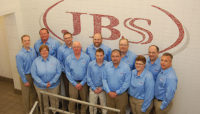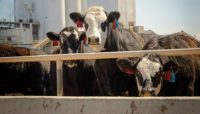Breaking News
JBS USA unveils plan for XL Foods' Brooks, Alberta, Canada, facility

JBS USA, held a press conference this afternoon to discuss details of its agreement with Canadian beef processor XL Foods, regarding the XL Lakeside facility in Brooks, Alberta, Canada.
Cameron Bruett, chief sustainability officer and head of corporate communications, laid out JBS' six-point plan for the Lakeside facility to the media in a Thursday afternoon press conference, in which The National Provisioner participated via conference call. JBS has had discussions with key stakeholders over the last week and has developed the plan, a strategy aimed at getting the plant up and running, producing safe beef products and potentially becoming part of JBS USA in the future.
"We all are aware of the recent recall," Bruett said. "Our job here is not to rehash the past or talk about what occurred, but instead to set a bold path forward, get people back to work and get safe Canadian beef back on the plates of domestic and international consumers."
Point No. 1 of the plan -- a top-to-bottom assessment of the facility -- has already begun in the past week, with food-safety, technical-services and IT, among other departments from JBS USA, having combed through the processes and capabilities of the plant and workforce.
JBS USA will institute robust workforce training -- point No. 2 in the plan -- within the walls of the facility, to ensure that every employee, supervisor has the proper worker and safety training needed to fit into JBS' operational requirements, prior to being able to return to the workplace. Initial training is expected to be complete Friday.
Third, JBS USA will have an independent audit of the plant and its food-safety plan conducted by Dr. Kerri Harris, executive director of the International HACCP Alliance. That audit is scheduled for Monday.
No. 4 in the plan is JBS USA's intention to re-open the plant Monday in a responsible fashion. The license to operate the facility was gained on Tuesday. Currently, JBS USA is working with Canadian inspectors to meet the requirements as set forth by the license, and Bruett expects the requirements to be met in order to re-open Monday.
Fifth, Bruett says, stakeholder engagement is a high priority at the facility. JBS USA looks to partner with the workers' union, the government and other stakeholders to move the plant forward in a cooperative way.
Finally, the sixth point in the plan was that the company and facility will keep the activities and plans around the re-opening of the plant as transparent as possible with the media and consumers.
Bill Rupp, president and CEO of JBS USA's North America and Australia beef business, opened his remarks by stating he sees a lot of opportunity in the Canadian beef industry, and believes there will be a strong sense of confidence in the products that come from the facility moving forward now that JBS has had significant dialog with the facility employees, the government and inspectors.
"Our focus first is getting this plant up and going," Rupp says. "It's critical to the employees and to providing safe products to the Canadian and world plates.
"Once it's up and running and well-controlled, we'll shift the focus to completing the acquisition, and it's a great addition to our North American portfolio," he added.
JBS USA owns eight plants in the U.S., and Rupp says this plant will offer the company great opportunities in "not a U.S. and Canadian market, but a North American market."
Rupp went on to say, once the acquisition is completed, the transition period begins.
"It becomes, how do we assimilate this and put it all together to be the best global beef-services company that there is?" he explained.
The plant was closed by the Canadian Food Inspection Agency (CFIA) on Sept. 27, 2012, after a significant recall of beef tainted with E. coli sickened 15 consumers in Canada and forced recalls in Canada and internationally. CFIA has since lifted its suspension of the operating license, allowing the plant to progressively resume operations.
Looking for a reprint of this article?
From high-res PDFs to custom plaques, order your copy today!






